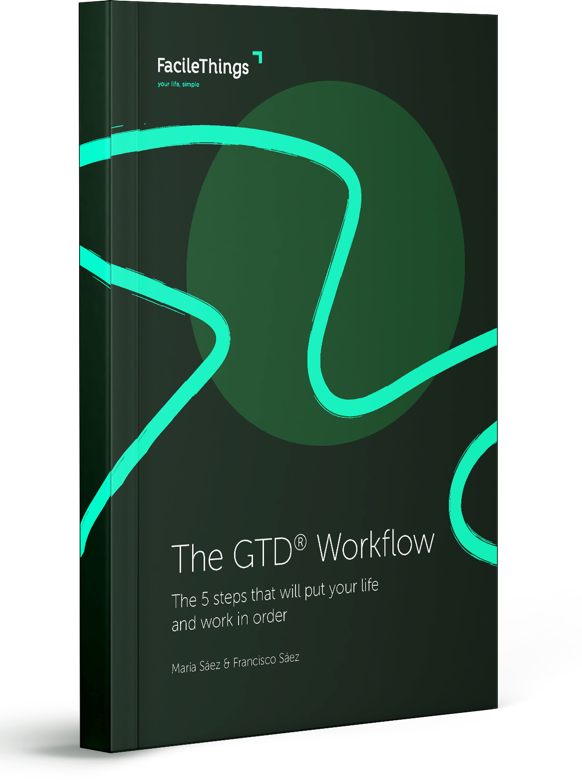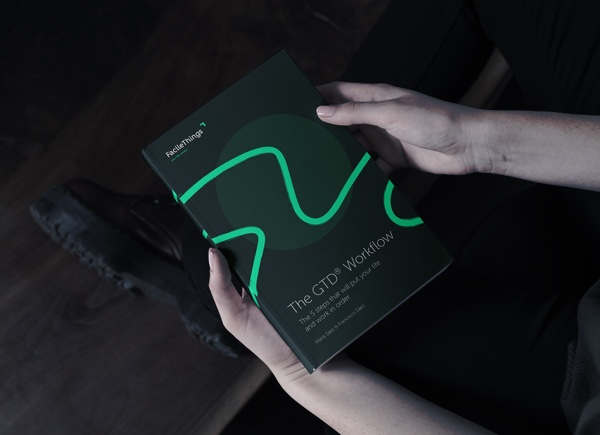Personal Productivity
Principles of Personal Productivity
AUTHOR: Francisco Sáez"Principles and rules are intended to provide a thinking man with a frame of reference." ~ Carl von Clausewitz

If you are a reader of this blog, you may be looking to organize yourself better so you can be more productive, or you are simply looking to expand your knowledge and skills to better manage your life.
It’s also possible that there are some elements in your life that prevent you from living the way you would really like to live: fear of losing your job, the stress of feeling constantly busy and absorbed by your work, lack of time to enjoy your hobbies, fear of failing in your personal relationships, etc.
We all suffer from these fears, often unfounded, at some point in our lives. The good news is that they can be eliminated. All you have to do is learn a few simple concepts that will change the way you think about personal productivity and how you manage your commitments.
You don’t need to know everything. As Ralph Waldo Emerson said, there may be a million methods of doing things, but there are only a few principles. The person who understands the principles gets the methods right.
Below I have compiled the principles that I consider most important to understand how we function in the aspects that most influence our personal productivity.
You don’t need any previous knowledge or any kind of experience. All these concepts are common sense; they are simple mental models that, taken as a whole, create a solid foundation from which to make sound decisions.
A mental model is an idea we form of how things work in the real world. Your brain automatically forms mental models from patterns and characteristics of your daily experiences. However, there are times when the mental models we create are inaccurate.
Education allows us to improve our mental models, internalizing the knowledge and experiences that other people have gathered throughout their lives.
On Your Body and Mind
If you want to be a more effective person, you’re going to have to take care of yourself. To work well, you not only need knowledge and skills; you also need your body and mind to be in top condition.
A good diet, combined with a little exercise and rest are the ingredients your body needs to have productive energy. A deficient supply of these components will cause performance to drop in quantity and quality.
Your brain is also a physical system and it needs certain things to function well, otherwise you may find yourself irritable, listless and discouraged for no apparent reason. To keep your mood from dropping, you need to generate enough neurotransmitters including dopamine and serotonin. These neurotransmitters are essential for your proper intellectual, physical and emotional functioning. These molecules are produced from substances found in the food we eat. If your diet is not very complete, you may need to take a multivitamin supplement to give your brain what it needs to perform properly.
Your thoughts, and your inner voice, are also important in being productive. Certain worries, unfounded or not, may be hijacking your attention a lot of the time. Meditation is a simple practice that can help you separate yourself from the voice echoing in your head. It’s nothing mystical; just breathe and let your mind wander. A few minutes of silent meditation can help you feel in control of situations.
On Your Motivation
We often find the motivation to do things automatically: our mind perceives the difference between how things are and how we want them to be, and we act to overcome that difference. Motivation leads us to move towards desirable things and away from things that are not desirable.
At other times, motivation is not automatic. Human beings are lazy by nature. As a survival mechanism, our evolution has allowed us to limit our energy consumption to strictly necessary situations. In any case, we must understand that motivation is an emotion, not a logical and rational reaction. In these cases where motivation is absent, we need to rely on willpower.
Willpower is the ability we have to interrupt our automatic processes in order to set them in motion in a different way. We need it to do things we don’t feel like doing but need to do. Keep in mind that our reserves of willpower are very limited and diminish with use.
To be effective we must create habits and routines for most things, as these can be carried out without the use of willpower.
About Your Attention
The ideal state to perform a task is one in which you are able to concentrate all your attention on one thing, without interference of any kind. This state is also called flow state.
To reach a fully productive state you need to eliminate distractions and potential interruptions. Depending on the level of cognitive activity in your work, it will take your mind anywhere from ten to thirty minutes to become absorbed in what it’s doing. That’s why the number one priority is to ensure that you don’t get distracted.
You should do your best to stimulate the attention process. Having the right place, with the right light and the right temperature, is important to keep your attention on what you are doing. There are methods such as the Pomodoro technique that can help you to start a task more easily, and to concentrate and ignore distractions. Not all techniques are to everyone’s liking, but feel free to experiment if you think one might help you.
Multitasking doesn’t exist. Neurologically, your brain cannot multitask. Every time you start a task, the brain has to download the context of what it’s doing into its working memory. Focusing your attention on one thing at a time allows your brain to download the context into its working memory only once, and that means you can concentrate your energy on accomplishing the task at hand. Working in blocks of similar tasks is an ideal strategy to avoid unproductive context switching.
Time cannot be managed. However, throughout the day the energy we have follows a natural cycle of ups and downs. When you have more energy, you are able to concentrate and accomplish a lot. When you have less, what your mind and body want to do is rest and recover.
On Thinking
Life is a sequence of think-do cycles, at many different levels. At the macro level, there are times in life when you must think about the future and make big decisions such as what to study, where to work, where to live, or with whom. At the micro level, every day you must think about what you are going to do today or how you are going to tackle your next task.
Thinking and reflecting is tremendously important to your productivity. As Peter Drucker said, there is nothing so useless as doing with great efficiency something that should not have been done at all.
There are two fundamental ways to externalize thoughts: writing and speaking. Both ways allow you to reflect more and better on a problem.
Writing not only gives you the ability to store information in a format that you can refer to later, but it also allows your mind to examine what you already know from a different angle. Getting your ideas down on paper will also allow you to better share them with others.
Talking (to yourself or to someone else) helps you to think more about a problem, even if the listener doesn’t say a word. Get used to externalizing your thoughts, don’t keep them to yourself.
Worrying about what is beyond your influence and what you cannot control is a waste of time and energy. The more you differentiate what you can control from what you can’t, the happier and more productive you will be.
On Getting Things Done
There are really only four ways to tackle any task that comes into your life:
- Do the task. This is the most successful option for dealing with important tasks that only you can do well.
- Eliminate the task. When it’s not important or necessary.
- Delegate the task. The right option when you cannot or do not want to do it, or there is someone else who can do it better than you or at a lower cost.
- Postpone the task. It’s effective in tasks that are not urgent or you cannot do now.
We cannot always be at 100% of our capacity. It is necessary to use the four ways of dealing with work to eliminate, postpone or delegate any work of little value.
You have a maximum load of things to do. Beyond a certain point, the more tasks you have to do, the worse the result will be. You need to set limits so that you don’t become overwhelmed. Also, keep in mind that in order to be able to handle the unexpected, you must have free time to react to the new.
The next action is the next specific, actionable task you can do right now to move a project forward. You don’t need to know everything that needs to be done to move a project forward; you just need to know the next step. To start a new project you just need to:
- Define what needs to happen before you can call the project complete.
- Describe the next step to move the project forward.
- Include the answers in a reliable system.
There are personal productivity systems based on these principles, such as GTD (Getting Things Done). If you need to better structure the way you manage your personal and professional commitments, don’t hesitate to learn about this methodology and experiment. A good organization should help you choose the task that makes the most sense to perform at any given moment.
Habits are actions that are repeated and that support us because, as we have already said, they don’t require willpower to carry them out. Creating habits requires a certain amount of willpower, but they are easy to adopt if you look for triggers that tell you, like a signal, when it’s time to act. You will get a better result if you try to acquire habits one at a time. Remember that your willpower has a daily limit.
A decision is the act of committing to a specific plan of action. When you make a decision, you isolate other possible avenues you could explore and are left with only the path you have committed to. No matter how good your personal productivity system is, it cannot make decisions for you. Systems can only provide you with information that helps you make a good decision.
Remember that decisions, no matter how big they are, are never made with all the information available. So gather enough information to be able to make a decision, and then act. If you don’t, you are also making a decision; life doesn’t stop because you refuse to choose.
Giving up the responsibility of making your own decisions only means that you are allowing other people, or circumstances, to make those decisions for you.
Conclusion
There are a set of best practices, some directly related to getting things done and others to consistent management of your life, that should be the cornerstone on which to build.
If you can understand the essential concepts that underpin personal effectiveness and build a solid foundation around them, it will then be much easier to expand your knowledge and make progress.
If you invest the time and energy necessary to learn and put these concepts into practice, you will be able to eliminate the fears that now worry you so much.





No comments